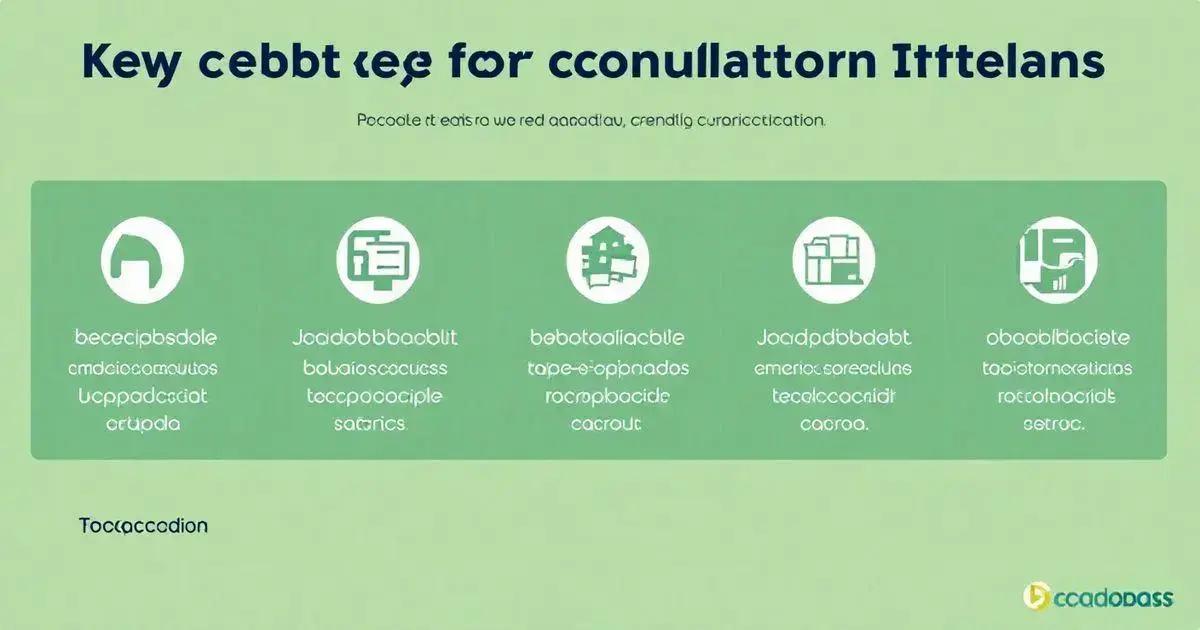Consolidation loans offer a straightforward way to manage multiple debts by combining them into a single payment. This approach not only simplifies your financial obligations but may also lower your overall interest rates, helping you save money over time.
Choosing the right consolidation loan involves understanding your eligibility and comparing lender options. Evaluating repayment terms and considering alternatives like credit counselling or balance transfer cards can also improve your financial strategy.
With proper planning, consolidation loans can be an effective tool for reducing debt and regaining financial control. Discover how this solution can simplify your path to financial stability!
What are Consolidation Loans?
Consolidation loans are financial products designed to help individuals combine multiple debts into a single loan. This means you take out one loan to pay off various existing loans, such as credit cards, personal loans, or other debts. By doing this, you create a more manageable payment plan, which can often result in lower monthly payments and a simplified financial situation.
How Do They Work?
When you apply for a consolidation loan, the lender will assess your financial situation, including your creditworthiness and the total amount of your debts. If approved, the lender provides you with a lump sum that you use to pay off your other debts. You will then be left with just one loan to repay, along with one interest rate, making it easier to track your finances.
Why Choose Consolidation Loans?
There are several reasons why individuals may opt for consolidation loans. First, they can lower your overall interest rate, depending on your credit score and the type of loan you choose. Second, these loans can help improve your credit score by reducing your credit utilisation ratio – as you are paying off your existing debts in full.
Who Can Benefit?
People struggling to keep track of multiple payments or those facing high-interest rates might find consolidation loans particularly beneficial. These loans can provide a fresh start by simplifying your debt repayment process and potentially lowering your interest costs.
Benefits of Consolidation Loans

Managing your debts effectively can offer several advantages for borrowers. Understanding these benefits can help you make informed decisions about your finances.
Simplified Payments
One of the biggest advantages is the simplification of the repayment process. Instead of juggling multiple payments each month, you only have one single payment to manage. This can reduce the stress associated with managing multiple deadlines and amounts.
Potentially Lower Interest Rates
You may benefit from lower interest rates compared to credit cards or other unsecured debts. This means you could save money on interest over time, making it easier to pay down your principal balance and get out of debt faster.
Improved Credit Score
By consolidating your debts and making regular payments on a single loan, you can improve your credit score. Lower credit utilisation due to paying off existing debts in full can positively impact your credit profile.
Fixed Monthly Payments
Many options come with fixed monthly payments, allowing you to budget more effectively. Knowing exactly how much you need to pay each month helps with financial planning and reduces uncertainty.
Faster Debt Repayment
You can potentially choose a repayment term that allows you to pay off your debt more quickly. This can lead to becoming debt-free sooner, giving you the financial freedom you desire.
Types of Consolidation Loans
Types of consolidation loans vary depending on the needs of the borrower and the type of debt they wish to consolidate. Understanding these types can help you choose the best option for your financial situation.
Personal Loans
One popular form of consolidation loan is a personal loan. These loans are typically unsecured, meaning you don’t have to provide collateral. You can use the funds to pay off your existing debts, allowing you to have a single monthly payment.
Home Equity Loans
If you own a home, you may consider a home equity loan. This type allows you to borrow against the equity in your home. The funds can be used to pay off other debts, and generally offers lower interest rates due to the secured nature of the loan.
Credit Card Balance Transfer
A balance transfer involves moving your existing credit card debt onto a new credit card, usually with a lower interest rate or a promotional rate. While this can help save money in interest, be aware of any fees associated with transferring your balance.
Government-Backed Loans
In some cases, government-backed loans may be available for debt consolidation. These can include options like federal student loan consolidation, enabling borrowers to combine their student loans into a single loan with potentially lower interest rates.
Debt Management Plans
While not a traditional loan, a debt management plan (DMP) is a structured approach offered by credit counselling agencies. They negotiate with creditors to lower interest rates and create a repayment plan, consolidating your payments into a single monthly fee to the agency.
Eligibility for Consolidation Loans

Eligibility for consolidation loans can vary by lender and the specific type of loan. Here are some common criteria that lenders may consider when assessing your eligibility:
Credit Score
Your credit score is one of the first things lenders look at. Most lenders prefer a credit score of at least 650, as a higher score indicates responsible credit behaviour. However, some lenders may offer solutions for those with lower scores.
Debt-to-Income Ratio
Your debt-to-income (DTI) ratio measures how much of your income goes towards debt payments. A DTI ratio below 40% is often considered ideal. Lenders want assurance that you can manage your new loan payments along with your existing financial obligations.
Employment Status
Having a stable job or steady income is important for most lenders. They often require proof of income, such as recent pay stubs or tax returns, to verify your ability to repay the loan.
Amount of Debt
The total amount of debt you have can impact your eligibility. Some lenders have minimum and maximum debt amounts for consolidation loans. It’s essential to check with the lender to understand their specific limits.
Type of Debt
The type of debt you wish to consolidate can affect your eligibility. For instance, student loans and credit card debt may have different eligibility requirements. Make sure to clarify with the lender about acceptable debts.
How to Apply for Consolidation Loans
Applying for a loan can be a straightforward process if you follow these steps to ensure you have all the necessary information and documents ready.
Step 1: Assess Your Finances
Before applying, evaluate your current financial situation. List your existing debts, interest rates, monthly payments, and remaining balances. This will help you understand how much you need to borrow and what your goals are.
Step 2: Check Your Credit Score
Your credit score plays a major role in your eligibility. Obtain a copy of your credit report to review your score and check for any errors. Make improvements if needed, such as paying down outstanding bills.
Step 3: Research Lenders
Look for lenders that offer loans for debt management. Compare interest rates, terms, and fees from different companies. You may consider banks, credit unions, or online lenders. Reading reviews can also help you find a reputable lender.
Step 4: Prepare Your Documents
Gather all necessary documents for the loan application. Common documents include proof of income, identification (like a driver’s licence), and details about your current debts. Being organised can speed up the process.
Step 5: Complete the Application
Most lenders allow you to apply online. Fill out the application form accurately, providing all requested information. Be prepared to explain why you want the loan and how you plan to use it.
Step 6: Review Loan Offer
If approved, the lender will send you an offer. Review the loan terms carefully, including the interest rate, loan amount, and repayment schedule. Ensure it meets your needs before accepting.
Step 7: Use the Funds Wisely
Once you receive the loan, use the money to pay off your existing debts immediately. This will simplify your payments going forward. Make sure to stick to your new repayment plan to improve your financial health.
Repaying Consolidation Loans
Repaying consolidation loans requires careful planning and commitment to ensure you meet your financial obligations. Here are some essential tips to help you manage your repayments effectively.
Create a Repayment Plan
Start by establishing a clear repayment plan after securing your consolidation loan. Determine how much you need to pay each month and make sure it fits your budget. Sticking to a plan helps prevent missed payments and additional fees.
Set Up Automatic Payments
Many lenders offer the option to set up automatic payments from your bank account. This ensures that your payments are made on time each month, reducing the likelihood of late fees and maintaining your credit score.
Monitor Your Progress
Regularly check your loan statements to track your progress in paying down the loan. Monitoring helps you stay accountable and reassess your budget if necessary. Celebrate milestones, such as paying off a portion of your loan, to keep motivated.
Communicate with Your Lender
If you encounter financial difficulties, reach out to your lender immediately. They may offer options like payment extensions or modified repayment plans to help you manage your loan more comfortably.
Consider Extra Payments
If your financial situation allows, consider making extra payments towards your loan. Paying more than the minimum can help reduce the total interest paid over the life of the loan and help you become debt-free sooner.
Finding Financial Freedom Through Consolidation
Consolidation loans can serve as a powerful tool for managing your debts and achieving financial freedom. By simplifying your payments and potentially lowering your interest rates, you can regain control over your finances.
Yet, it’s crucial to understand the various types of consolidation loans available and assess your eligibility to make informed decisions. Exploring alternatives, such as credit counselling and debt management plans, can also provide beneficial options.
By implementing a solid repayment strategy and remaining proactive in managing your financial situation, you can work towards a debt-free future. Remember, the key to success is finding the approach that best fits your unique circumstances.





